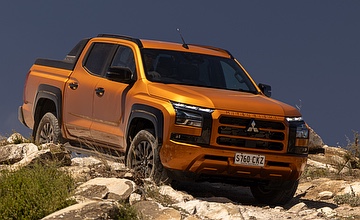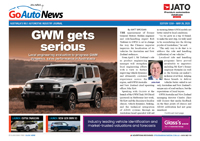OptionsCar reviews - Mitsubishi - Triton - GSRMitsubishi modelsOverviewWe like Light and accurate steering, accessible low-end torque, decent ride/handling balance Room for improvement Slow-acting idle-stop technology, over-zealous ADAS systems, drum brakes at the rear The Triton is one of the best dual-cabs going, and one we'd heartily recommend15 Jan 2025 By MATT BROGAN Overview
MITSUBISHI’S Triton has always represented great value for money, and the new-generation vehicle, despite its price rise, is no exception.
Available from $43,690 plus on-road costs, or $3250 more than in the previous generation, the range-topping GSR variant tested here is available from $63,840 +ORC, taking the fight to the likes of the Ford Ranger Wildtrak and Toyota HiLux Rogue.
Offered currently in Club- and Double-Cab pick-up body styles and in two- and four-wheel drive formats, the Triton is powered by a twin-turbocharged 2.4-litre four-cylinder diesel engine.
The updated Triton engine now develops 150kW at 3500rpm and 470Nm from 1500-2750rpm, an increase of 17kW/40Nm over the single-turbo predecessor. From launch, a six-speed automatic transmission is the only unit available.
Braked towing capacity steps up by 400kg to match most segment rivals at 3500kg.
The vehicle tips the scale at 2170kg (kerb) and offers a GCM of 6250kg. It measures 5320mm in length, 1930mm in width, and 1795mm in height, and rides upon a 3130mm wheelbase.
Standard idle-stop technology helps improve fuel consumption and emissions, the range now sipping as little as 7.5 litres per 100km (199g/km) in 4x2 format and 7.7 litres per 100km (200g/km) in 4x4 guise.
On test we managed a decent 8.4 litres per 100km in mixed driving which, from the Triton’s 75-litre tank, suggests a touring range of over 890km.
Equipment highlights for the flagship Triton GSR include 18-inch alloys in black (with matching spare), a body-coloured grille, dual-zone climate control, wheel arch mouldings, styling bar, roof rails, leather upholstery with orange stitching, GSR-branded floor mats and power driver’s seat adjustment.
On the connectivity side, we find a 9.0-inch central infotainment array with included Apple CarPlay (wireless) and Android Auto (wired) support, AM/FM/DAB+ radio reception, USB charging, and a 7.0-inch digital instrument panel.
A broadened safety suite sees the Triton equipped as standard with front cross-traffic alert and a driver monitoring system in addition to forward collision mitigation with pedestrian detection, cyclist detection, and junction assist, rear AEB, and a centre airbag.
All Triton grades are equipped with dual top-tether and ISOFIX child seat anchorages in the back seat.
The Mitsubishi Triton scored a solid five-star ANCAP crash rating when tested in April of last year.
Paint colours extend to eight with red and white the only solid options. Metallic, mica and prestige hues include White Diamond, Black Mica, Blade Silver, Graphite Grey, Impulse Blue, and Yamabuki Orange.
Mitsubishi backs the Triton with a 10-year / 200,000km warranty provided the vehicle is serviced by a Mitsubishi dealership. Otherwise, the warranty reverts to five years or 100,000km.
Service intervals are pegged at 12 months /15,000km (whichever comes first), with capped servicing costs equating to $1467 over three years, $2445 over five years, or $6690 over 10 years.
Driving Impressions
As we noted at the launch of the all-new Triton last year, the driving experience of Mitsubishi’s latest dual-cab model is considerably improved from its predecessor, feeling more planted, more energetic, and more supple over pockmarked surfaces.
Sampling the vehicle in mostly urban confines we were impressed by the weight and accuracy of the Triton’s steering, the sharper electrically assisted rack requiring just 3.3 turns to spin from lock to lock and delivering a class competitive 12.7m turning circle.
We also appreciated the larger diameter dampers and the consistency they bring to the ride of the Triton. The double wishbone front suspension and long travel three-leaf springs (with a live axle at the rear) provides sufficient articulation in urban running, and aids in confident response to directional changes in all but the wettest of conditions.
Braking performance is consistent with a pedal stroke well matched to the application, the disc/drum combination adequate, but dated when viewed against rivals with standard four-wheel discs.
Engine performance is decent with easily accessible low-end torque and appropriate gearing. The unit will keep well with fast-flowing city traffic and is low revving at freeway speeds.
As noted earlier, the fuel economy returns are a welcomed byproduct of the Triton’s new twin-turbo engine and should bring a smile to the face of prospective owners. It’s a shame, then, the idle-stop system is slow to re-engage, and in our experience, best when switched off.
Tyre, wind, and mechanical noise is generally well attenuated with negligible thrum from the Triton’s 18-inch H/T rubber. The cabin is spacious and well presented, with controls falling to hand in logical sequence.
The dual-zone climate control managed hot weather well, though rear-seat passengers remarked that the ceiling-mounted fan box did little to improve comfort. We appreciated the fitment of hard buttons (i.e., not a touchscreen) for HVAC control, which we found helped keep our eyes on the road.
And that’s a big plus in a vehicle with such a narrow driver attention threshold. Glance to the side when entering an intersection or dare to change radio stations and the sixth generation Triton’s over-zealous ADAS systems will chime in with a warning. It’s frustrating, and unnecessary, and would certainly be an annoyance to Mitsubishi owners.
Fortunately, we could hand the car back…
While we’re certain the ADAS nannies won’t be a deal-breaker for most, they did detract from what is otherwise a terrific package that represents excellent value for money.
With a little fine-tuning – and perhaps the inclusion of some rear disc brakes – we reckon the Triton would just about be one of the best dual-cabs going, and would recommend it to tradies, farmers, recreational buyers, or just about anyone that needs a solid ute, regardless of its minor shortcomings.
 Read more2nd of October 2024  Mitsubishi adds Triton GLX-R variantRunning changes see addition of GLX-R variant to Mitsubishi Triton line-up9th of August 2024  Mitsubishi lowers Triton payloadTriton GLS and GSR now available with ‘sub-1000kg’ payload alternative16th of April 2024  Five-star safety for Mitsubishi TritonMitsubishi Triton ute first to score five ANCAP stars under more stringent test protocols |
OptionsClick to share
|
















Facebook Twitter Instagram